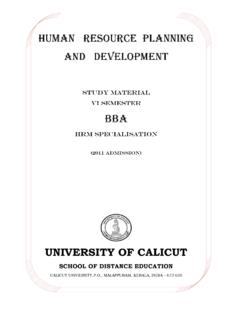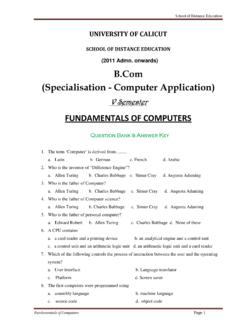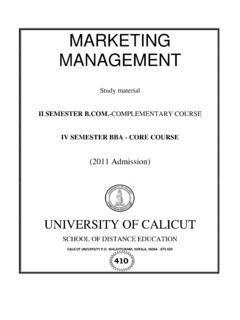Transcription of VI SEMESTER CORE COURSE - University of Calicut
1 INCOME TAXLAW ANDPRACTICESTUDY SEMESTERCORE COURSE (2011 ADMISSION) University OF CALICUTSCHOOL OF DISTANCE EDUCATIONTHENJIPALAM, Calicut University , MALAPPURAM, KERALA-693 635341 School of Distance EducationIncome Tax Law and PracticePage2 University OF CALICUTSCHOOL OF DISTANCE EDUCATIONS tudy SEMESTERCORE COURSEINCOME TAXLAW AND PRACTICEP repared . TAssistant Professor,Department of Commerce, , Madappally,Vadakara,CalicutScrutinised ,Associate Professor,Department of Commerce, , Madappally,Vadakara, CalicutType settings & Lay outComputer Section, SDE ReservedSchool of Distance EducationIncome Tax Law and Tax in India--An Introduction52 Income Exempt from Income Tax153 Income from Salaries184 Income from House Property375 Income from Business or Profession436 Capital Gains547 Income from Other Sources668 Clubbing of Incomes749 DeductionfromGross Total Income8210 Computation of Tax Liability of Individuals94 School of Distance EducationIncome Tax Law and PracticePage4 School of Distance EducationIncome Tax Law and PracticePage5 Chapter 1 Income Tax in India---An IntroductionBRIEF HISTORY OF INCOME TAX IN INDIAInIndia, Income tax was introduced for the first time in 1860.
2 By Sir James Wilson in order tomeet the losses sustained by the Government on account of the Military Mutiny of ; several amendments were made in it from time to time. In 1886, aseparate Income taxact was passed. This act remained in force up to, with various amendments from time to time. In1918, a new income tax was passed and again it was replaced by another new act which waspassed in Act remained in force up to the assessment year 1961-62 with Income Tax Act of 1922 had become very complicated on account ofinnumerable amendments. The Government of India therefore referred it to the law commissionin1956 with a view to simplify and preventthe evasion of tax. The law commission submitted itsreport-in September 1958, but in the meantime the Government of India had appointed the DirectTaxes Administration Enquiry Committee submitted its report in consultation with theMinistry of Lawfinally the Income Tax Act, 1961 was Income Tax Act 1961 hasbeen brought into force with 1 April applies to the whole of India including Jammu law in IndiaThe incometax law in India consists of the followingcomponents:1.
3 Income tax Acts2. Income tax rules3. Finance Act4. Circulars, notifications etc5. Legal decision of Act:Every year, the Finance Minister of the Government of India presents the Budget to the Finance Bill is approved by the Parliament and gets the assent of thePresidentof India, it becomes the Finance Rules:The administration of direct taxes is looked after by the central board of direct Taxes (CBDT).The CBDT is empowered to make rules for carrying out the purposes of the Act. For the properadministration of the Income-tax Act, the CBDT frames rules from time to time. These rules arecollectively called Income-tax Rules, and Notifications:Circularsare issued by the CBDT from time to time to deal with certain specific problems and toclarify doubts regarding the scope and meaning of the provisions. These circulars are issued forthe guidance of the officers and/or DefinitionsAssessment Year : Section 2(9) Assessment year means the period starting from April 1 and ending on March 31 of the :Assessment year 2013-14 which commenceson April 1, 2013andendson March 31,2014.
4 Income of previous year of anassessee is taxed during the assessment year at the ratesprescribed by the relevant Finance Act for tax of Distance EducationIncome Tax Law and PracticePage6 Previous year : section 3 Income earned in aparticularyear is taxable in the next year. The year in which income is earned isknown asprevious year and the next year in which income is taxable is known as assessment year. Inotherwords, previous year is the financial year immediatelyproceedingthe to the general rule that previous year s income is taxable during the assessment yearIn the following situations income ofan assessee isliable to be assessed to taxin the sameyearin which he earns the income:a. Income of non-residents from shipping;b. Income of persons leaving India either permanentlyor for a long period of time;c. Income of bodies formed for short duration;d .Income of a person trying to alienate his assets with a viewto avoiding payment of tax;e.
5 Income of a discontinued :Section 2(31)The term person includes:1. an individual;2. a Hindu undivided family;3. a company;4. a firm;5. an association of persons or a body of individuals , whether incorporated or not;6. a local authority; and7. every artificial juridical person not falling with in any of the preceding : Section 2(7)Every person in respect of whom, any proceeding under the act has been taken for the assessmentof his income or of the income of any other person in respect of which he is assessable or of theloss sustained by him or by such other person or the amount ofrefund due tohim or to such otherperson may be called an Assessee:A person who is deemed to be an assessee for some other person is called Deemed Assessee .Assessee In Default:When a person isresponsible for doing any workunder the Income Tax Act and he fails to do it,he is called an Assessee in default .Assessment [Section 2(8)]This is the procedure by which the income of an assessee is determined by the Assessing Of Charge Of Income Tax Sec : 4 Toknow the procedure for charging tax on income, one should be familiar with the tax-Income-tax is an annual tax on rate of assessment year-Income of previous year is chargeable to tax in the nextfollowing assessment year at the tax rates applicable for the assessment year.
6 This ruleis, however, subject to some exceptions3. Rates fixed by Finance Act-Tax rates are fixed by the annual Finance Act and notby the Income-tax Act. For instance, the Finance Act, 2013, fixes tax rates for theAssessment Tax on person-Tax is charged on every person5. Tax on total income-Tax is levied on the total income of every assessee computedin accordance with the provisions of the of Distance EducationIncome Tax Law and PracticePage7 INCOME : Section2 (24)The definition of the term income in section 2(24) is inclusive and not , the term income not onlyincludes those things that are included in section 2(24) butalso includes those things that the term signifies according to its general and natural , in general, means a periodic monetary return which accrues or is expected to accrueregularly from definite sources. However, under the Income-tax Act, 1961, even certain incomewhich do not arise regularly are treated as income for tax purposes Winnings from lotteries,crossword 2(24) of the Act gives a statutory definition of present, the following items of receipts are included in income: (1) Profits and gains.
7 (2) Dividends.(3) Voluntary contributions received by a trust/institution created wholly or partly forcharitableor religious purposes or by an association or institution(4) The value of any perquisite or profit in lieu of salary taxable under section 17.(5) Any special allowance or benefit other than the perquisite included above, specificallygranted tothe assessee to meet expenses wholly, necessarily and exclusively for theperformance of the duties of an office or employment of profit.(6) Any allowance granted to the assessee to meet his personal expenses at the place wherethe duties ofhis office or employment of profit are ordinarily performed by him or at aplace where he ordinarily resides or to compensate him for the increased cost of living.(7) The value of any benefit or perquisite whether convertible into money or not, obtainedfrom a company either by a director or by a person who has a substantial interest in thecompany or by a relative of the director or such person and any sum paid by any suchcompany in respect of any obligation which, but for such payment would have beenpayable by the director or other person aforesaid.
8 (8) The value of any benefit or perquisite, whether convertible into money or not, which isobtained by any representative assessee mentioned under section 160(1)(iii) and (iv), orby any beneficiary or any amount paid by the representative assessee for the benefit of thebeneficiary which the beneficiary would have ordinarily been required to pay.(9) Deemed profits chargeable to tax under section 41or section 59.(10) Profits and gains of business or profession chargeable to tax under section 28.(11) Any capital gains chargeable under section 45.(12) The profits and gains of any insurance business carried on by Mutual Insurance Company orby a cooperative society, computed in accordance with Section 44 or any surplus taken to be suchprofits and gains by virtue of the provisions contained in the first Schedule to the Act.(13) The profits and gains of any business of banking (including providing credit facilities)carried on by a co-operative society with its members.
9 (14) Any winnings from lotteries, cross-word puzzles, races including horse races, card gamesand other games of any sort or from gambling, or betting of any form or nature whatsoever.(15) Any sum received by the assessee from his employees as contributions to any provident fundor superannuation fund or Employees State Insurance Fund (ESI) or any other fund for thewelfare of such of Distance EducationIncome Tax Law and PracticePage8(16) Any sum received under a Keyman insurance policy including the sum allocated by way ofbonus on such policy will constitute income. Keyman insurance policy means a life insurancepolicy taken by a person on the life of another person where the latter is or was an employee or isor was connected in any manner what so ever with the former s business.(17) Any sum referred to clause (va) of Section 28. Thus, any sum, whether received or receivablein cash or kind, under an agreement for not carrying out any activity in relationto any business; ornot sharing any know-how, patent, copy right, trade-mark, licence,franchise, or any otherbusiness or commercial right of a similar nature, or information or technique likely to assist in themanufacture or processing of goods or provision of services, shall be chargeable to income taxunder the head profits and gains of business or profession.
10 (18) Any sum of money or value of property referred to in section 56(2)(vii) or section56(2)(viia).(19) Any consideration received for issue of shares as exceeds the fair market value of sharesreferred to in section 56(2)(viib).Gross Total Income Sec: 80b (5)As per section 14, the income of a person is computed under the following fiveheads:1. Income from house Profits and gains of business or Capital Income from other the income is not derived from any of the above sources, it is not taxable under the act. Theaggregate income under these heads is termed as gross total income .Total Income Sec : 2(45)Total income means the the amount left after making the deductions under section 80C to 80 Ufrom the gross total IncomeAny receipt which is of a casual and non-recurring nature is called casual income. Casual incomeincludesthefollowing receipts:1. Winning from lotteries,2.








